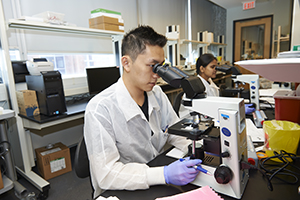Medical Laboratory Science - Bridge
Overview
 Medical laboratory technologists are in high demand due to the health-care system becoming increasingly dependent on sophisticated laboratory technologies to diagnose, monitor and treat disease.
Medical laboratory technologists are in high demand due to the health-care system becoming increasingly dependent on sophisticated laboratory technologies to diagnose, monitor and treat disease. Modern health care has become increasingly dependent on complex laboratory tests, the results of which aid in the diagnosis, monitoring and treatment of disease. You will gain fundamental knowledge and skills in biological, physical and health sciences. The medical laboratory science-specific courses cover five laboratory disciplines: biochemistry, hematology, histotechnology, microbiology and transfusion science.
This program is accredited by EqualTM Canada, and upon successful completion, you will be eligible to write the Canadian Society for Medical Laboratory Science “General MLT” certification examination. To practice as an MLT in Ontario (and other regulated Canadian jurisdictions), graduates of the program must, in addition to completion of the CSMLS certification exam, meet the standards set by the College of Medical Laboratory Technologists of Ontario, including obtaining a criminal record and judicial matters or vulnerable sector check. Please see the following websites for additional information regarding the requirements for practicing as an MLT in Canada. ; .
I recommend the Medical Laboratory Science program at Ontario Tech because you finish the program with a degree that allows for further educational opportunities, as well as a professional career qualification enabling you to enter the industry immediately. This program gives you multiple career opportunities, making it perfect for those who like a challenge. Courtney Coughlan Bachelor of Health Sciences (Honours) in Medical Laboratory Science Class of 2012
Admissions
Admissions
An Ontario college advanced diploma in Biotechnology - Advanced* with a minimum B+ average. Successful applicants will be required to present a comprehensive Human Anatomy and Physiology course at the college or university level.
*Only graduates from Durham College and Fleming College will be considered for admission.
The following Anatomy and Physiology courses have been pre-approved:
Durham College
- ANAT 1500 Anatomy and Physiology
or
- BIO 1581 Anatomy and Physiology I
- BIO 2582 Anatomy and Physiology II
or
- BIO 1502 Anatomy and Physiology I
- BIO 2502 Anatomy and Physiology II
Fleming College
- NRSG 163 Anatomy and Physiology I
- NRSG 167 Anatomy and Physiology II
Mohawk College
- HSCI 10027 Anatomy and Physiology
Michener Institute
- AP807 Gross Anatomy and Physiology
Trent University
- BIOL 1050H Human Anatomy
- BIOL 1051H Human Physiology
ĂČĂĂÉçÇř
- HLSC 2202U Comprehensive Anatomy and Physiology
| Last year's cut-off | 80 per cent |
|---|---|
| Expected cut-off | Low-80s |
The application process and important dates/deadlines are outlined on our .
Career opportunities
- Administrative and/or policy development
- Biotechnology and Pharmaceutical Researcher
- Commercial laboratories producing reagents, vaccines
- Computer and information systems companies
- Reagent, Instrument and Pharmaceutical Sales Representative
- Registered Medical Laboratory Technologist (MLT)
Experiential learning
Students will have the opportunity to apply their knowledge and get hands-on experience in the simulation laboratories. As theoretical knowledge expands, so does experiential knowledge. In fourth year, students will be placed in a diagnostic medical laboratory for the final two practicum semesters where they will work under the supervision of a medical laboratory technologist and perform increasingly complex procedures on human specimens. Clinical placements give students hands-on practice, experience in different work environments and the opportunity to network with potential employers.
NOTE: In the final year of study, after completing all didactic program courses, students must complete a 25-week-long clinical placement at an approved training site. Clinical placement may occur across the province, and students are not guaranteed to receive a placement at their preferred clinical site. Students are responsible for all costs of attending clinical placement, including transportation and finding a suitable residence.
Did you know?
-
Sample courses
- Loading...
- Loading...
- Loading...
- Loading...
- Loading...
- Loading...
- Loading...
- Loading...
- Loading...
- Loading...
- Loading...
- Loading...
- Loading...
- Loading...
- Loading...
- Loading...
- Loading...
- Loading...
- Loading...
- Loading...
- Loading...
- Loading...
- Loading...
- Loading...
- Loading...
- Loading...
- Loading...
- Loading...
- Loading...
- Loading...
- Loading...
- Loading...
- Loading...
For program requirements, including required number of credits for completion, program maps and course descriptions, please see the academic calendar and course catalogue of Loading.... Courses are subject to change without notice. -
Med Lab tour

